|
|
|
Andrew
Kerr and Teddy Goldstein
|
|
|
|
Both Andrew Kerr and Teddy Goldstein are
talented singer/songwriters who bring great energy and humor to their live
performances. Meeting in New York City
in the mid '90s, Andrew and Teddy formed a strong professional, and personal,
relationship that is a treat to experience firsthand. If you like intelligent
lyrics infused with self-effacing humor, you need to check out Kerr and
Goldstein's work, including Kerr's most recent CD entitled Silver
Suitcases. Way Cool Music sat down
with Kerr and Goldstein to learn about surviving friendship in the music
business, writing for others and what really might be on the other side of a
rainbow.
|
|
|
|
Way
Cool:
|
How did you become friends? |
|
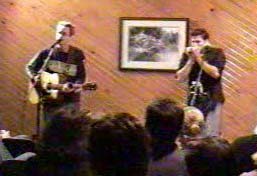
|
|
|
|
| Teddy
Goldstein: |
We met at Fast Folk Cafe in New York.
|
|
|
|
| Andrew
Kerr:
|
I used to host an open mic there.
|
|
|
|
| TG:
|
Andrew was running the open mic and I was a
performer.
|
|
|
|
|
WC:
|
How many years ago was this?
|
|
|
|
|
TG:
|
In '95.
|
|
|
|
|
AK:
|
Actually, we started by bonding over James Taylor
trivia. We both were huge James Taylor
fans. We would say a line of any James
Taylor song.
|
|
|
|
|
TG:
|
Not even a line; just say a word.
|
|
|
|
|
AK:
|
Yeah. We would say a word like, "Sea."
|
|
|
|
|
TG:
|
What's an example?
|
|
|
|
|
AK:
|
Porpoise...
|
|
|
|
|
TG:
|
Oh, that's good..."And the porpoise has the blues/ My
recollection's faulty and I cannot find my shoes/ And my wiring is misfiring/
Let it fall down, let it fall down, let it fall, fall, fall." And then he would get a point.
|
|
|
|
|
AK:
|
You only get one point for porpoise?
|
|
|
|
|
TG:
|
Well, then I would come up with another one that's pretty
tough. Something from 'Mud Slide Slim
and the Blue Horizon.'
|
|
|
|
|
AK:
|
I would be pretty sketchy with that one cuz I lost that one.
|
|
|
|
|
WC:
|
Describe your individual writing process.
|
|
|
|
|
AK:
|
My individual writing process usually starts with·these days
it's different. Early on, I would write
the full song in advance and then I would put it to music. I would write it in verse, like a poem, and
then put it to music. Now, it tends to
be that, a lot of times, I will by playing the piano or guitar and there's just
a vibe or feel to what I'm playing that I really like. Then, I will start singing the most
pathetic, ridiculous words, and they are always really cliche and cheesy and
really bad. And then, at some point, I
say, "I really like that." Usually,
there's a line or two that I find are really cool and have a hook to it. Then, I'll come back to it and tear it apart
to rewrite it.
|
|
|
|
|
WC:
|
Are you recording that?
|
|
|
|
|
AK:
|
Usually, I'll put it on my cell phone or play it enough
times so I won't forget it. Because you do worry about losing that little
melodic thing you have. Then, you have
to have it make sense.
|
|
|
|
|
TG:
|
I usually read a book like the Joy Luck Club, anything by Amy Tan.
|
|
|
|
|
WC:
|
Does she have more than one book?
|
|
|
|
|
TG:
|
No, I just reread that one a lot.
|
|
|
|
|
AK:
|
You usually drink a Coke to get in the mood, don't you?
|
|
|
|
|
TG:
|
Yeah, I usually have a soda. No, I usually come up with the music first. And, I feel like if it's a good enough
melody, then it says a few lines to you.
Then, you have to work for the second verse...
and bridge... and the third
verse.
|
|
|
|
|
AK:
|
Totally, but the first idea·
|
|
|
|
|
TG:
|
It blows out and you're like, "Shit." It's like you are hearing it for the first
time yourself. But, then you have to go
back and wonder why did that come out.
Then, you have to go back and do the writing.
|
|
|
|
|
AK:
|
And, you can't just repeat the same verse.
|
|
|
|
|
TG:
|
Exactly. If songs
could be 10 seconds long, I'd have a million of them. But, it's a bitch when you have to go back and write the second
verse.
|
|
|
|
|
AK:
|
Like with 'Jealousy,' you probably just started with the
first verse, "What's the matter with a little old-fashioned jealousy/ Just
enough to know that you care for me?"
|
|
|
|
|
TG:
|
I usually write melody first, and the chorus.
|
|
|
|
|
WC:
|
Even though your lyrics are so descriptive?
|
|
|
|
|
TG:
|
Yeah, I know.
|
|
|
|
|
AK:
|
At first, we try things out on each other. And, we say, "That verse isn't really
working." Then, you hear it later and
it's not even the same song. We tear
our stuff apart. If you're really
critical about the words, then the song never comes together.
|
|
|
|
|
WC:
|
Have you two ever written anything together?
|
|
|
|
|
TG:
|
We haven't.
|
|
|
|
|
AK:
|
I've written with Anne (Heaton). We don't officially do songwriting credits on each other's
things. But, when I was recording 'More
For Me,' Teddy, Edie (Carey) and Sam Shaber were all in the studio with
me. We wanted to record it that day,
but I didn't have a chorus and I didn't know what to do. I had it on a chalkboard. I'd say, "I need it to feel like this... want
to be... more for me... we need a rhyme."
He'd help edit tons of my songs and say, "That's too many times with
that one phrase" or whatever.
|
|
|
|
|
TG:
|
We play things for each other all the time.
|
|
|
|
|
AK:
|
We help edit each other, but we never plan it...
Well, there was that time back in '82, but, we shouldn't
really talk about it.
|
|
|
|
|
WC:
|
What's the most surprising or interesting thing that
inspired you to write a song?
|
|
|
|
|
TG:
|
Let's answer this one for each other. I'd say for you it's 'Silver Suitcases.'
|
|
|
|
|
AK:
|
I didn't expect it to be a song, necessarily.
|
|
|
|
|
TG:
|
Because that was true story.
|
|
|
|
|
AK:
|
Finding money by the side of the road and feeling so
overwhelmed by it that I wanted to write it down that it became a song.
|
|
|
|
|
|
|
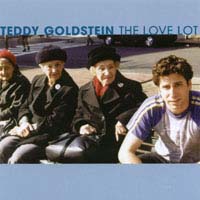
|
|
TG:
|
What would mine be?
|
|
|
|
| AK:
|
Yours would be a love song about...
|
|
|
|
| TG:
|
Oh, I know. 'Love,
Love, Love' I wrote after seeing Runaway
Bride.
|
|
|
|
| AK:
|
Really? That
surprises me.
|
|
|
|
| WC:
|
Are you surprised that he wrote the song
or that he saw the movie?
|
|
|
|
| AK:
|
Surprised that he saw that movie.
|
|
|
|
|
|
TG:
|
Where she kept dumping guys at the alter.
|
|
|
|
|
AK:
|
Surprised that movie even came out!
|
|
|
|
|
TG:
|
Also, The Wedding
Singer with Adam Sadler where he got left at the alter. And Crimes
and Misdemeanors. All three of
those movies·that was surprising.
|
|
|
|
|
AK:
|
I often don't know where your inspiration comes from. I think I know where that song comes from.
But, you say, "No, it's about my third grade math teacher." I usually assume it's about his current or
ex-girlfriend because there'd be one line in it has that person. But, he'll say, "That one line, OK maybe."
|
|
|
|
|
TG:
|
Yeah, one line is usually about a specific person.
|
|
|
|
|
WC:
|
How often do you try to figure out where the songs came
from?
|
|
|
|
|
TG:
|
We usually know where each other's songs came from.
|
|
|
|
|
AK:
|
We usually ask as well.
We'd ask, "Is that a true story?"
|
|
|
|
|
WC:
|
You live a somewhat similar lifestyle·
|
|
|
|
|
AK:
|
Yeah, lots of sex with groupies.
|
|
|
|
|
WC:
|
Yeah, I know I'm holding you up from that. But, have you ever written about a similar
experience?
|
|
|
|
|
TG:
|
Good question. I
could see that, but I don't think we have.
|
|
|
|
|
AK:
|
There's got to be similar themes. We both like the idea of poignancy with pieces of humor thrown
in. Yeah, we've written about family
themes.
|
|
|
|
|
TG:
|
The road...
'Rock Star' and 'On the Road' are very similar.
|
|
|
|
|
AK:
|
They are similar in that we are making fun of ourselves.
|
|
|
|
|
TG:
|
They have almost the same lines like yours is, "They'd
rather hear 'Fire and Rain,'" and mine is "Was that a flush or was someone
telling me to hush?"
|
|
|
|
|
WC:
|
So, before a concert, if you are going to play 'Rock Star,'
do you say, "I can't play 'On the Road?'"
|
|
|
|
|
AK:
|
No, we usually just follow each other with them.
|
|
|
|
|
TG:
|
Live, we usually say something like, "That song reminds me
of this one."
|
|
|
|
| WC:
|
Have you ever competed for a gig?
|
|
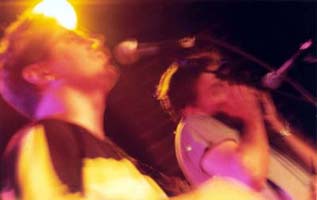
|
|
|
|
| AK:
|
Is there anything to win?
|
|
|
|
| TG:
|
There's no competition.
There's nothing to win.
|
|
|
|
AK:
|
It's the opposite.
|
|
|
|
| TG:
|
We help each other.
|
|
|
|
| AK:
|
We would share, if the other one had a gig.
|
|
|
|
|
|
TG:
|
Some people are, apparently, like that. But, that's one of the best things about me,
Andrew, Edie, Anne and Sam. We are all
friends. There are people we know who
are like that, but we are not good friends with those people.
|
|
|
|
|
AK:
|
But, I'm still shocked when I play a show with a friend of
mine, and we are doing a split bill.
And, I find out that they are negotiating what percentage of the door
that they are getting versus mine because they think their draw is higher than
mine so they should get more of the take.
That's how it always, apparently, works on the business side.
|
|
|
|
|
TG:
|
We've never done that.
|
|
|
|
|
AK:
|
We always share. We
don't really care who brings in more people.
|
|
|
|
|
TG:
|
I've opened for Sam and for other friends, and that's different. But, that's based on the venue cuz they had
a gig and they needed an opener. They
ask, "Are you around because we need an opener?" And, I say, "Yeah, sure."
|
|
|
|
|
AK:
|
And then you start negotiating how much you get paid
(kidding).
|
|
|
|
|
WC:
|
How do traditional folk performers react to your brand of
music with its biting humor?
|
|
|
|
|
TG:
|
We don't meet them...
I've never met one. I've seen some, but I keep my distance.
|
|
|
|
|
AK:
|
We stay away.
|
|
|
|
|
TG:
|
You only meet them at places like a Folk Alliance or a
festival.
|
|
|
|
|
AK:
|
That's when we realize we are not folk. We are solo guitar players and we're
storytelling singer/songwriters.
|
|
|
|
|
TG:
|
But, we're not traditional.
|
|
|
|
|
AK:
|
Those people hate our music.
|
|
|
|
|
TG:
|
Yeah.
|
|
|
|
|
AK:
|
There are some people who abhor me. (Teddy) at least has a few songs that they
say are pretty.
|
|
|
|
|
TG:
|
No, they hate everything.
|
|
|
|
|
AK:
|
I've played in some folky venues and they say, "This is
repulsive. Why are you in my room playing this crap?"
|
|
|
|
|
WC:
|
So, you learn to avoid?
|
|
|
|
|
TG:
|
It's not even that hard.
I never even see them.
|
|
|
|
|
AK:
|
They avoid you as well.
|
|
|
|
|
WC:
|
What do you call your brand of music?
|
|
|
|
|
TG:
|
Singer/songwriter.
|
|
|
|
|
AK:
|
Contemporary folk singer/songwriter. But, if I had the money to tour with a band,
they'd say I was a rock act.
|
|
|
|
|
TG:
|
Exactly, all of us do our albums with bands.
|
|
|
|
|
AK:
|
To me, as I'm listening to the radio, it reminds me that
really what I do is what rock music was in the '70s. Similar to Jackson Browne and others like him·it was literate,
smart rock music.
|
|
|
|
|
TG:
|
They just did well enough to bring a band with them on the
road.
|
|
|
|
|
AK:
|
People like Jackson Browne, it was really about the
writing. It was good songs. It was pop music at the time. We are doing 70's pop music, I guess. How's that?
|
|
|
|
|
TG:
|
Makes us sound really hip and contemporary...
we are writing
pop music from my father's generation... hope the kids will enjoy this song.
|
|
|
|
|
|
|
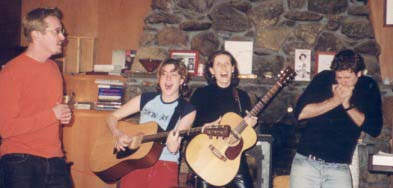
|
|
WC:
|
How common is in-the-round format like what you do during Live
From New York?
|
|
|
|
| TG:
|
It's been around, but I really didn't see it that much
before us.
|
|
|
|
|
|
AK:
|
Really? I used to go
to the Bitter End (club in NYC) once a month for a songwriter's circle
thing. I've seen it forever.
|
|
|
|
|
TG:
|
I guess...
Shawn Colvin, Greg Brown and John Gorka did it.
|
|
|
|
|
AK:
|
And folk festivals.
It's meant to be like sitting in the living room and casual. You are sitting on the side stages and talk
about your songs and play them.
|
|
|
|
|
TG:
|
We definitely perfected that art form.
|
|
|
|
|
WC:
|
So, that's a bit of folk tradition coming into play.
|
|
|
|
|
TG:
|
Those people aren't folk either.
|
|
|
|
|
AK:
|
Yeah. A Mighty Wind was trying to bring folk
in.
|
|
|
|
|
TG:
|
Kingston Trio was folk.
Tom Paxton was folk.
|
|
|
|
|
AK:
|
Pete Seeger was folk.
When you hear folk, you know it's folk.
|
|
|
|
|
WC:
|
I've seen the in-the-round format more and more.
|
|
|
|
|
TG:
|
It works well. It's
a good way to cross paths.
|
|
|
|
|
AK:
|
It's not very rock, but it's good.
|
|
|
|
|
WC:
|
How much longer do you think Live From New York will perform together?
|
|
|
|
|
TG:
|
It's interesting that you ask that...
what time is it now?
|
|
|
|
|
AK:
|
We actually don't have any dates currently scheduled. Everyone is doing his or her own thing
now. It doesn't mean we're not going to
perform together again. Just at the
moment, we're not.
|
|
|
|
|
WC:
|
It was interesting that Anne, Edie and you guys were all in
town at the same time this week.
|
|
|
|
|
TG:
|
We all hung out last night.
|
|
|
|
|
AK:
|
But, everyone had their own shows...
just doing their own
thing.
|
|
|
|
|
WC:
|
Do all of you have specific career paths that are distinct
from each other?
|
|
|
|
|
TG:
|
A couple of years ago, they were pretty similar. Now, they are pretty distinct. Anne is doing her own thing, Edie is pulling
her's, I'm pulling mine.
|
|
|
|
|
AK:
|
I guess so. I think,
to some extent, what ties us together is that we all wanted to make a living by
playing music. That was the goal,
initially. But, Teddy's been writing
for other people and he's got some songs on other records. And, he's writing songs that are like
classics the moment he writes them.
|
|
|
|
|
TG:
|
Anne is trying the rock band thing.
|
|
|
|
|
AK:
|
Edie has stayed and embraced the singer/songwriter thing as
her core. Me? I'm just trying to get enough sleep to get through the next day
since I have a young child now. For me,
my goal is to continue to play music, and enjoy it, and make a living at it.
|
|
|
|
|
TG:
|
You were doing a lot of college shows...
they obviously pay
pretty well. And, they can afford you
to do the $50 opening for someone you actually like.
|
|
|
|
| AK:
|
My career path is pretty haphazard. I never focus·that's probably the
problem. What I really want to do is
play music and make a living doing what I enjoy.
|
|
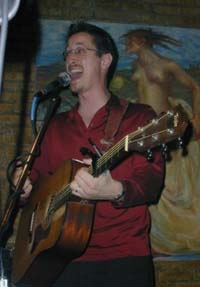
|
|
|
|
| TG:
|
That's really it.
|
|
|
|
| AK:
|
You just try to write songs.
|
|
|
|
| TG:
|
I like performing too.
|
|
|
|
| WC:
|
What else would you be doing, if the music thing didn't work
out?
|
|
|
|
| TG:
|
Andrew can answer that better than me.
|
|
|
|
| AK:
|
I'd be doing a hundred different things...
fixing a
toilet... painting a house. I'd be doing
something to make a living while not losing my mind.
|
|
|
|
|
|
TG:
|
I don't know what else I'd be doing. I need to figure that out, though.
|
|
|
|
|
WC:
|
Tell me about writing for other people.
|
|
|
|
|
TG:
|
Not much to say right now.
|
|
|
|
|
AK:
|
Like when Faith Hill calls you up and says she needs a hit,
how do you approach that?
|
|
|
|
|
TG:
|
I don't know. I'm
really new at it. I've been co-writing
with a bunch of different people. I'm
trying to find out how to get songs placed.
|
|
|
|
|
WC:
|
Teddy, you've had some success with that, haven't you?
|
|
|
|
|
TG:
|
A little bit. I was
trying to write for a publishing company for a year. They've done a little bit of placement stuff for me.
|
|
|
|
|
AK:
|
You've gotten some stuff on TV shows. He's got a song on a record in Germany
that's pretty big.
|
|
|
|
|
TG:
|
Yeah, that's a German band.
I wrote a song with a German producer.
I just wrote the lyrics, he wrote the music. He had dummy lyrics in there and he said, "Change these."
|
|
|
|
|
WC:
|
Is there a difference in how or what you write when you are
writing for others versus for yourself?
|
|
|
|
|
TG:
|
Yeah, definitely.
|
|
|
|
|
AK:
|
You write something good.
|
|
|
|
|
TG:
|
I'm a little less personally invested in it, but thinking
more about, "Does this make sense?" In
a way, it's easier.
|
|
|
|
|
AK:
|
I think you stay away...
your songs tend to have some dark,
comic effects.
|
|
|
|
|
TG:
|
Like 'Roller coaster,' a new song,
it wouldn't be for anyone else. I knew
when I started writing it that it was gonna be just for me.
|
|
|
|
|
AK:
|
You take out lines like, "Cutting
off balls"... not as radio-friendly.
|
|
|
|
|
WC:
|
Do you sing songs that you've written for other people?
|
|
|
|
|
TG:
|
Yeah, I did one tonight.
That song called, 'Changing.' I wrote that with three other writers.
|
|
|
|
|
AK:
|
Didn't you sing another one tonight?
|
|
|
|
|
TG:
|
Oh yeah, 'Gotta Love.'
|
|
|
|
|
AK:
|
That's definitely coverable.
|
|
|
|
|
WC:
|
Your voice changes so much when
you sing. When you write for other
people, do you try to keep it little more basic?
|
|
|
|
|
TG:
|
When I'm writing with other
people, I'm not really conscious of my voice.
|
|
|
|
|
AK:
|
When you wrote 'Changing,' were
you hearing a woman's voice?
|
|
|
|
|
TG:
|
Yeah. We were thinking about making it really breathy. Almost putting in words that sound like a
singer could really get into and show off their voice.
|
|
|
|
|
WC:
|
Do you have someone in mind when
you write?
|
|
|
|
|
TG:
|
This is all sort of new to
me. But, this song, 'Changing' I was
thinking, obviously, someone like Faith Hill would be great. But, maybe you find a new artist that is the
next Faith Hill and who hasn't gotten a good song yet. That could be her breakout song.
|
|
|
|
|
WC:
|
Teddy, tell me about Folk Cribs (which
is a short film in the style of MTV Cribs found on Goldstein's website).
|
|
|
|
|
TG:
|
It came out of Waiting for Guffman. It's my Waiting
for Guffman, but it was about folk.
|
|
|
|
|
WC:
|
Did you get idea before you found
the location or did it inspire the idea?
|
|
|
|
|
TG:
|
I thought that would be funny cuz
it's my niece and nephew's playhouse at my mom's house. So, we drove down from New York, shot all
the scenes in a day, came back (to NYC) and edited it all together.
|
|
|
|
|
AK:
|
What was the other one (video clip
on Teddy's website)?
|
|
|
|
|
TG:
|
We did an interview, kind of like
a press junket for 'The Love Lot.'
|
|
|
|
|
AK:
|
That was hysterical.
|
|
|
|
|
WC:
|
Andrew, tell me about making the new CD.
|
|
|
|
|
AK:
|
The process was way different than any CD I made before
because I had a new child and felt like it was a hard time to spend tons of
money on a studio record. But, I really
wanted to make something I'd be excited and happy about, and proud of. So, I decided instead to buy some basic
gear. And, the stuff had come to the
point that I could do the whole thing on my laptop. My three or four year old laptop, at that. We recorded things one or two tracks at a
time. We tracked things all over the
place. A lot of friends pitched in and
played on it. Brian Winton, Melissa
Ferrick's drummer, played in his apartment with two mics set up. The drums ended up sounding better than any
other drums I had before. It reminds
you that people used to make records before they could record drums on 25
tracks. The drums are supposed to sound
good without 20 microphones·they are acoustic instruments built to sound
right. The bass was recorded in my
friend's girlfriend's bedroom at 2:00 in the morning. I recorded the cello part with Matt Fish before a show at Notre
Dame. He played on 'Picture of
You.' They held the doors because it
would have gotten too loud if people were allowed in. We were in a broom closet, and ran the song through three times.
|
|
|
|
|
|
|
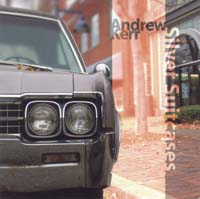
|
|
TG:
|
That's amazing.
|
|
|
|
| AK:
|
It was a cool process.
Teddy's on it, all my friends are on it. I got great musicians on it from all over the place. It was the most fun I've had. It tuned me into a lot of things, and I
learned a lot from the process. I'm happy
about it.
|
|
|
|
| WC:
|
Are you happy being independent artists or are either of you
looking for a record deal?
|
|
|
|
| TG:
|
I'm not.
|
|
|
|
|
|
AK:
|
If they want to give me a lot of money. But, I hear that people don't get a lot of
money anymore with record deals. I'm
not looking for anything. If something
seemed appropriate or right, I guess I would.
But, I'm not looking for anything.
|
|
|
|
|
WC:
|
Is it holding you back?
Is there anything you can't do as an indie artist?
|
|
|
|
|
TG:
|
Yeah, billions of things. You can't get on the radio. You
can't sell a lot of records.
|
|
|
|
|
AK:
|
You can't tour with a band.
|
|
|
|
|
TG:
|
Definitely holding me back.
I'm not looking for a record deal, but I wouldn't say, "No."
|
|
|
|
|
AK:
|
Looking for a deal is a ridiculous process.
|
|
|
|
|
TG:
|
They're (label) gonna come to you. They know you're out there.
|
|
|
|
|
AK:
|
Matt (Nathanson) wanted a record deal and was annoyed for a
long time that he didn't have one. And
then, finally, he got one when he was playing for 500 people every night,
touring none stop all over the country.
Up until then, when he was playing coffee shops, they were soliciting
stuff but said, "I don't hear a hit yet."
|
|
|
|
|
TG:
|
It's big business...
a lot of money at stake. They know what they want.
|
|
|
|
|
AK:
|
They probably come to you when you don't need them
anymore. What do I need half a million
dollars for?
|
|
|
|
|
TG:
|
Yeah, you got a laptop.
|
|
|
|
|
AK:
|
I got Pro Tools.
What do I need with their money?
What would I buy...
another laptop... a second computer...
a 2004 Civic and trade
in my '98?
|
|
|
|
| WC:
|
What artists are you listening to?
|
|
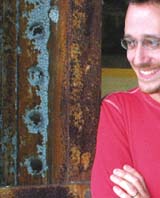
|
|
|
|
| TG:
|
Besides each other?
|
|
|
|
| AK:
|
I feel like I've been listening to someone recently...
do you
know Paul Simon? He's great.
|
|
|
|
| TG:
|
Patty Griffin.
|
|
|
|
| AK:
|
Cake and Rhett Miller.
I love Old 97s.
|
|
|
|
| TG:
|
David Mead, his new record is great.
|
|
|
|
|
|
WC:
|
What advice could you give to novice singer/songwriters?
|
|
|
|
|
TG:
|
Get out now.
|
|
|
|
|
AK:
|
Dance lessons. Play
shows, practice a lot, write a lot... just do it.
|
|
|
|
|
TG:
|
Be an opener as much as you can.
|
|
|
|
|
AK:
|
Start playing anywhere, in coffee shops, open mics,
anywhere. Just do a lot and get
better. If you're not ready to be an
opener, play at local places and build a following.
|
|
|
|
|
WC:
|
You mentioned open mics...
|
|
|
|
|
TG:
|
Yeah, open mics are important.
|
|
|
|
|
AK:
|
Yeah, I played an open mic competition with John Mayer in
Atlanta a couple of years ago. I came
in second, he came in first. My point
is that he was playing in open mic contests just a short time ago, and he did
well.
|
|
|
|
|
WC:
|
Teddy, describe Andrew.
|
|
|
|
|
TG:
|
Does the word hot mean anything to you? Sexy.
Boy, these questions are hard.
|
|
|
|
|
AK:
|
These are fun.
|
|
|
|
|
WC:
|
Can you describe Andrew in three words?
|
|
|
|
|
TG:
|
I'd say genuine, real, just wanting to have fun. He wants to enjoy people. And, if they're not into that, he says,
"Fuck them." But, most people like to
be enjoyed so it works out pretty well.
And, also he's into people doing the same to him. He's got a great sense of humor and can
handle it if people come at him. He
makes fun of people and people make fun of him. He likes to bring that out in people. That (answer) was pretty good...
good luck.
|
|
|
|
|
|
|
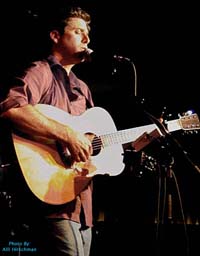
|
|
AK:
|
My turn? I have a
very short list, and Teddy is at the top of the funniest people I know. When I hang out with Teddy and Edie, they
make me laugh more than any other people in the world. Sometimes, I forget how hysterical Edie
is. But, you are, quite possibly, the
funniest person that I know. Teddy, in
a sense, doesn't really care what you think.
I don't mean that in a negative way.
Teddy likes to tell a joke and never lets you know it's a joke. And, two years later, it still doesn't
matter if you knew it was a joke or if you laughed because it was funny as hell
to him. He has the driest sense of
humor ever. He doesn't really care if
you think it's funny or not. I'm
laughing at him, not with him.
|
|
|
|
|
|
TG:
|
But, I'm not laughing.
|
|
|
|
|
AK:
|
Teddy's serious side is that he is a loyal, reliable sort of
friend. Someone I cherish. If you
really need him, he's there. There's no
flakiness or inconsistency. If I called
him and said I needed his help, he'd be there.
|
|
|
|
|
TG:
|
That's what holds all of us together. That's why we're friends.
|
|
|
|
|
AK:
|
You can't steal my answer.
|
|
|
|
|
|

|
|
|
|
|
What's the worst job
you've ever had?
|
|
|
AK:
|
I was working for a stock company that had to get proxy
votes from shareholders. Our job was to call and get the people's votes. And, if they didn't agree with the
corporation, we were supposed to throw the votes away. If they did agree with the company angle,
then we were supposed to count the votes.
That was the worst job. I got
fired after three weeks for making fun of everybody.
|
|
|
|
TG:
|
Mine was working for a parasail company on the Hudson
River. I had to hold the line until
they took off. And, I almost lost my
hand over and over. I almost lost my
fingers. I said, "Fuck this," and I
quit. I did it for one day. Never went back.
|
|
|
|
|
|
|
What's your favorite
movie or lyric quote?
|
|
|
TG:
|
It'd probably be Paul Simon from 'Graceland,' "Losing love
is like a window in your heart. Everyone sees that you are blown apart."
|
|
|
|
AK:
|
That's amazing.
That's a really good one. I'll
give you a James Taylor line. I wrote
it in my yearbook page. It doesn't make
sense though, but anyway·"There's a man up here/ He claims to have his hands
upon the reins/ There are chains upon his hands/ He is riding upon a train." I just always liked it.
|
|
|
|
|
TG:
|
You're right, it makes no sense.
|
|
|
|
|
AK:
|
That's a fucking acid trip.
But, I'll keep it.
|
|
|
|
|
|
|
Who would you want to
star in the movie of your life?
|
|
|
AK:
|
Can I star in my own life?
I'll let Drew Carey do it. No,
actually, I want Wesley Snipes.
|
|
|
|
TG:
|
Redd Foxx.
|
|
|
|
|
AK:
|
Redd Foxx and Drew Carey...
and Wesley Snipes reunite in the
"Teddy and Andrew Story."
|
|
|
|
|
|
|
What's your favorite TV
theme song?
|
|
|
TG:
|
Welcome Back, Kotter or Three's Company.
|
|
|
|
AK:
|
Greatest American Hero.
|
|
|
|
|
|
|
If you were a
superhero, what would your name be?
|
|
|
TG:
|
Lance. No, it would
be Terry and I would wear
terry cloth. That'd be my
gimmick. I could absorb incredible
amounts of liquid with quickness.
|
|
|
|
AK:
|
I would be Clarence, the middle-aged train conductor from
Detroit who can spin a mean yarn.
|
|
|
|
|
|
|
What do you want to be
when you grow up?
|
|
|
AK:
|
I think I'm being it.
Just living my life. I want to
be someone who's not bitter and continues to keep a balance in his life. And, pursue things that he's passionate
about. And, no regrets. It's hard at
times. I'm proud of myself in that I
could have gone down another path. I've
worked corporate jobs where I didn't like it, but made good money. Even when I
found that I had to make money outside of music, I found a route, somehow, to
feel like I wasn't compromising more than I could afford.
|
|
|
|
TG:
|
I'd like to take Andrew's
answer. It's not a career thing. I think, right now, I'd like to be a
songwriter. But, I'd also like to be
a family person... start my own maybe. That
looks like a good job.
|
|
|
|
|
AK:
|
You're gonna need some help.
|
|
|
|
|
TG:
|
Yeah, I'll need some help...
a wife.
|
|
|
|
|
AK:
|
I know a guy. My mom knows a guy that can help.
|
|
|
|
|
TG:
|
I might need a girlfriend...
I have a girlfriend. I might need a wife, kids...
I'd like to do
that.
|
|
|
|
|
|
|
Finally, why are there
so many songs about rainbows?
|
|
|
TG:
|
Because of Kermit the fucking frog.
|
|
|
|
|
AK:
|
I don't know any...
are there?
|
|
|
|
|
TG:
|
There are actually.
|
|
|
|
|
AK:
|
The End of the Rainbow is a song about that song...
Kermit is
singing about that song.
|
|
|
|
|
TG:
|
You know what? I
don't think there are that many songs about rainbows. I think it's more of a metaphor...
and what's on the other
side. I think there are songs about
what's on the other side.
|
|
|
|
|
AK:
|
People don't use that as a metaphor...
like the grass is always
greener on the other side of the rainbow?
|
|
|
|
|
TG:
|
It's a complete thought.
It's not just "Why are there so many songs about rainbows"...
period. It's "Why are there so many songs about
rainbows and what's on the other side?"
|
|
|
|
|
AK:
|
Do people talk about what's on the other side?
|
|
|
|
|
TG:
|
It's all about the other side. The rainbow is your current life and the other side is what you
want it to be. Really, I don't
know... that's my answer. I don't know.
|
|
|
|
|
|
WC:
|
Wow, thanks so much for your time! This was a lot of fun and very enlightening.
|
|
|
|
To find out more information about Andrew
Kerr, visit his website at www.andrewkerr.com.
|
|
|
|
|
To find out more information about Teddy
Goldstein, visit his website at www.teddygoldstein.com.
|
|
|
|